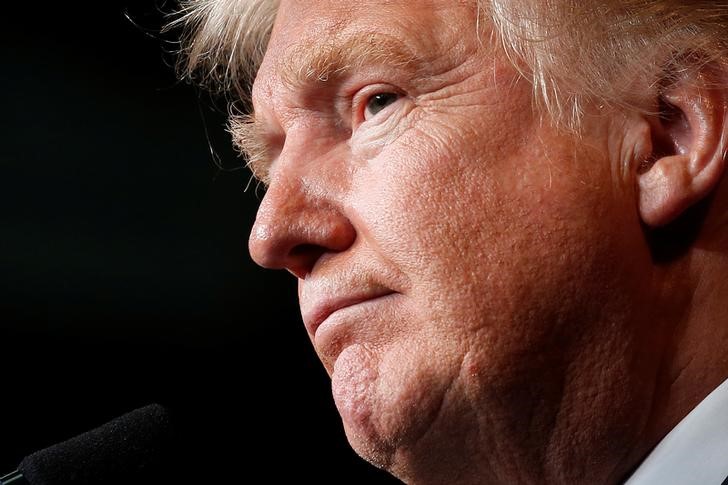Investing.com -- As the 2024 U.S. presidential election draws near, investors are increasingly focused on how the potential outcomes could shape the economy and financial markets.
The starkly different policy approaches of Donald Trump and Kamala Harris offer contrasting visions that could significantly influence key areas such as the stock market, taxation, government spending, and consumer behavior.
The stock market's reaction to a Trump or Harris victory would likely diverge markedly, reflecting the candidates' differing approaches to taxation, regulation, and spending.
Under a Trump administration, the outlook for U.S. equities appears generally positive. Analysts at Alpine Macro suggest that Trump's policies, particularly his commitment to maintaining low corporate taxes and continuing deregulation, would be supportive of broader equity markets.
Sectors such as industrials, financials, and energy are expected to thrive under this scenario.
Trump's approach to governance, characterized by a preference for limited regulatory oversight, would likely boost corporate profits, leading to enhanced stock market performance, especially in sectors like banks, capital markets, and energy equipment and services.
However, the potential risks of a Trump presidency should not be overlooked. His aggressive stance on trade, particularly with China, and his immigration policies could create headwinds for labor-intensive industries and companies with significant international exposure.
The possibility of new tariffs and trade barriers could disrupt supply chains and increase costs, which might offset some of the gains from tax cuts and deregulation.
On the other hand, a Harris administration would present a different set of challenges and opportunities for the stock market.
As per analysts at Alpine Macro, the prospect of higher corporate taxes and increased regulation under Harris could weigh on equities, particularly in sectors like technology, financials, and biopharma, which are sensitive to changes in tax policy and regulatory scrutiny.
Harris’s focus on social equity and environmental sustainability could lead to a regulatory environment that imposes new burdens on businesses, potentially curbing profit margins and slowing investment in these industries.
Nevertheless, certain sectors could benefit from Harris's policies. Retail, homebuilding, and consumer services might see a boost from her plans to increase government support for lower-income households and invest in affordable housing.
By directing resources towards these areas, a Harris administration could stimulate consumer demand, particularly among lower-income households, thereby providing a lift to these sectors.
Tax policy is a critical area where the two candidates offer stark contrasts, with significant implications for both corporate and individual taxpayers.
Trump’s approach to taxes is likely to build on the foundation laid by his 2018 Tax Cuts and Jobs Act (TCJA).
Alpine Macro anticipates that Trump would push for the extension of the TCJA, keeping the corporate tax rate at a competitive 21%, which would maintain the U.S. as an attractive environment for business investment.
This policy would particularly benefit capital-intensive industries by preserving tax incentives for investment in equipment, property, and research.
Additionally, Trump may advocate for further tax reductions, although such proposals might face resistance depending on the composition of Congress.
In contrast, Harris's tax proposals signal a shift towards higher taxes, particularly for corporations and wealthy individuals.
“A Harris administration with bicameral control likely results in a U.S. corporate rate closer to 25-28% and higher international levies, as a mechanism to fund credits to lower-income cohorts and social spending,” the analysts said.
For individual taxpayers, Harris’s plans include raising taxes on high earners, changing the treatment of capital gains, and imposing higher taxes on large estates.
These changes could reduce disposable income for wealthy individuals, potentially dampening their consumption and investment in the stock market.
When it comes to government spending, both candidates are likely to continue the trend of elevated federal expenditures, but with different priorities that reflect their broader economic philosophies.
Trump's spending priorities are expected to focus on infrastructure, defense, and initiatives aimed at boosting family formation. His proposals, such as building "Freedom Cities" on federal land and investing in air mobility technology, are designed to stimulate economic growth through infrastructure development and technological innovation.
This approach could provide a significant boost to sectors like aerospace, defense, and construction, all of which stand to benefit from increased federal investment.
In contrast, Harris is likely to prioritize spending on social programs, such as childcare, education, healthcare, and clean energy infrastructure.
Her focus on social equity and environmental sustainability would lead to increased government spending in areas that support low-income households and promote green energy.
This could benefit sectors such as consumer staples, utilities, and clean energy, where government spending and subsidies would drive demand and investment.
The potential impact of each candidate’s policies on consumer spending and economic confidence is another critical factor to consider.
Under a Trump administration, consumer confidence could remain strong, particularly among middle and upper-income groups, who would continue to benefit from lower taxes and a favorable regulatory environment.
This confidence could translate into robust consumer spending, supporting sectors like retail, real estate, and discretionary goods.
However, the risks associated with Trump's trade policies, such as potential price increases on consumer goods due to tariffs, could pose a threat to purchasing power and overall consumer spending.
A Harris administration, on the other hand, might boost consumer spending through targeted government programs aimed at lower-income households.
By expanding tax credits and increasing support for affordable housing and childcare, Harris’s policies could lead to increased spending in sectors like retail and homebuilding, particularly in the mass-market segment.
However, the potential for higher taxes on businesses and wealthy individuals could lead to higher costs for consumers, potentially offsetting some of the gains from increased government spending.
